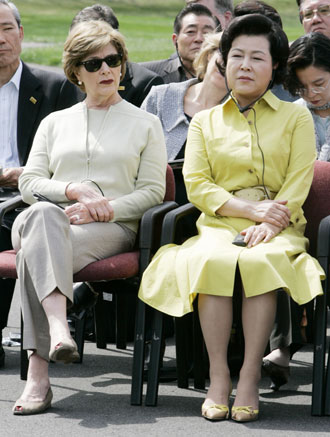New hopes and challenges for US-South Korea relations
(Xinhua)
Updated: 2008-04-20 14:39
Updated: 2008-04-20 14:39
WASHINGTON -- US President George W. Bush concluded two days of talks with South Korean President Lee Myung-bak at the presidential retreat in Camp David, Maryland Saturday.
 |
The meeting looked successful by all accounts, but it might be some time before the world sees the two allies taking any major joint action over issues of mutual concern.
RETURN TO INTIMACY
Bush's decision to meet his South Korean counterpart at Camp David, a casual venue reserved for his buddies, rather than at the White House, clearly demonstrates his response to Lee's pledge to "further consolidate the traditional friendship with the United States."
Apart from the cordial setting for the meeting, the White House has also been very forthcoming in hailing its traditional ties with Seoul.
"(South) Korea is a strategic ally of the US, and we look forward to this opportunity to advance our global agenda with (South) Korea's new leadership," US Secretary of State Condoleezza Rice told reporters on the eve of the summit.
However, ties between the two nations were not quite as harmonious a few years ago.
Washington-Seoul relations had cooled under Lee's predecessors Roh Moo-Hyun and Kim Dae-jung, both of whom had expressed unconditional support for the Democratic People's Republic of Korea (DPRK), raising suspicions in the US.
CHALLENGES ON DPRK'S NUCLEAR ISSUE REMAIN
With some nine months remaining in Bush's presidency, and with the settlement of the Korean Peninsula's nuclear issue still hanging in the balance, it might be difficult for Bush and Lee to find enough time for joint efforts to close a diplomatic deal related to the issue.
|
||
|
||
|
|
|
|

